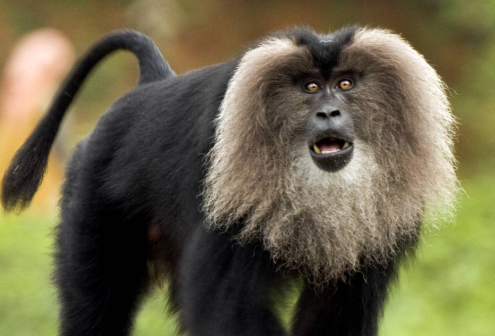Human-Wildlife Interactions Threaten Macaques
Recent research marks the urgent situation facing the lion-tailed macaque, an endangered species endemic to the Western Ghats of India, which reveals how human activities, such as road construction and tourism, have disrupted the macaques’ natural behaviors and habitats.
Study Overview
Researchers from the Kerala Forest Research Institute and the University of Mysore conducted a comprehensive study on lion-tailed macaques. They examined eight locations across the Western Ghats, including Anamalai Hills and Agumbe. Their findings were published in the journal Primate Conservation.
Human-Macaque Interactions
Approximately 25% of the macaque population in the study areas interacts with humans. These interactions involve accepting food from tourists, scavenging waste, and entering villages. Such behaviors lead to malnutrition, disease transmission, and increased road accidents, putting the species at further risk.
Certain areas, like Valparai and Sabarimala, are identified as hotspots for human-macaque interactions. High tourist and pilgrim traffic exacerbates the situation. Initially, macaques avoided human food, but habitat destruction and increased tourism have altered their foraging habits.
Conservation Status
The lion-tailed macaque is classified as endangered on the IUCN Red List and is protected under CITES. The species faces threats from habitat loss, human encroachment, and population fragmentation. Long-term human interactions can lead to unhealthy diets and increased mortality rates.
The researchers stress the importance of immediate action to protect the lion-tailed macaque. They recommend public awareness campaigns to discourage feeding wildlife, enforcing regulations against such practices, and restoring natural habitats to support the macaques’ survival. Without prompt intervention, the species risks extinction.
GKToday Notes:
- Lion-tailed Macaque: This endangered primate is endemic to India’s Western Ghats. With only 4,200 individuals left, it faces threats from habitat loss and human interaction, risking extinction.
- Kerala Forest Research Institute (KFRI): Established in 1979, KFRI conducts research on forest ecosystems. It plays a very important role in conservation efforts and sustainable forest management in Kerala, India.
- CITES: The Convention on International Trade in Endangered Species aims to ensure that international trade does not threaten species survival. It provides a framework for protecting endangered animals and plants.
- IUCN Red List: The International Union for Conservation of Nature’s Red List assesses species’ extinction risk. It serves as a critical indicator of global biodiversity health and conservation status.
Month: Current Affairs - December, 2024
Category: Environment Current Affairs








